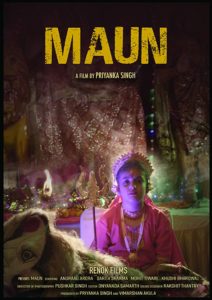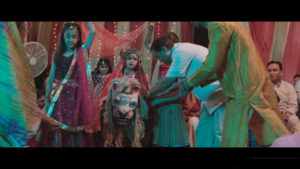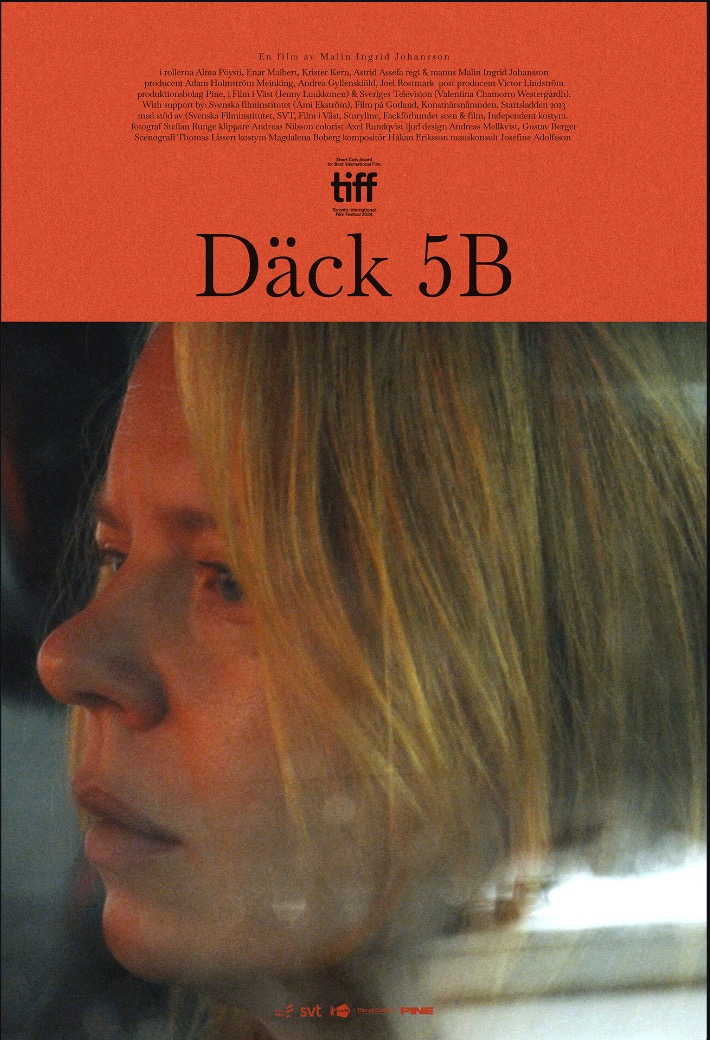
DFW SAFF 2019 Short Film Review “Maun”
WATCH THE TRAILER HERE
First, the Recap:
A darkness within, the shadowy realm of the conscious mind with its awareness of things most wish to leave unsaid, undisclosed, hidden away from seeing the light of day. There reside the deepest secrets we maintain, quarantined, isolated, still–all in silence. Yet, facing even the bitterest and sickening truths can only bring the ability, ultimately, to heal, to reach a place of absolution and forgiveness. Right? For two parents, Meera (Sarita Sharma) and Mohan (Anuraag Arora), the current acknowledgement and crushing realizations they now have need to air out between them carry with them a burden too much to imagine or have any real hope of bearing. Their young, 10-year old daughter Shreya (Khushi Bhardwaj) has been subject to molestation.
Even as this particular evening is coming about, one that both Meera and Mohan shoulder with heavy hearts and inward rage beyond words, the two know despite the abhorrent reality they’ve realized about their precious child and the monster, Dev (Mohit Tiwari), who’s perpetrated the heinous crimes, traditions and cultural heritage demand they attend a ceremony that will usher in a continued life of freedom for Dev and unknown distress for Shreya in light of the wrongs already done to her. Meera’s outright anger and judgement of the situation clashes with Mohan’s equally passionate bouts with denial and inaction, the two arguing, both in shock and outrage. As the night’s activities arrive, it signals two parent’s despair and one young girl’s further loss of childhood and innocence.
Next, my Mind:
As another part of the short film programming being screened at the 2019 Dallas Fort Worth South Asian Film Festival sponsored by Toyota USA, this 10-minute effort from writer/director/producer/executive producer Priyanka Singh wastes no time in utilizing a deftly executed subtlety in visual presentation and pairing it with a boldly provocative thematic exploration of the nightmare that is child abuse. Providing the viewer with a perspective of two parent’s severely colliding notions about exposing the truth vs. abject negation of events that have unfolded while putting further fuel to the fire by enfolding it within the context of a deviant’s pending nuptials, the narrative passes by with impactful purpose and shines an all-too-revealing light on the harsh actuality of a mother’s resentment, a father’s inadequacy to handle what action he should pursue, and a girl’s shame and guilt that gets buried under it all, once again becoming the illustration of just how victimized the child becomes.
It’s a tough message to swallow and accept, as no one ever wants or desires to breach topics like this because of the discomfort it causes in general. Yet, it therefore remains the strength and fearlessness of indie filmmakers to choose to remind us that there are dire situations like this happening every day and that our ability to fight against it, while it seems so limited on the surface, might actually be greater than we realize IF we would just speak up or otherwise get engaged however we can, rather than just thinking our “Wow! That’s awful!” and casting it from our minds. The film doesn’t pull any punches in showcasing exactly how the pain, anger, disaffirmation, and overall hesitancy to accept what’s fact can converge and cause further damage to the situation by battling against each other, in the meantime watching the ramifications of the abuse dig themselves into the innocent victim who’s completely burdened by humiliation as it is, and facing the worse lie of it all–they’re alone in the struggle. This has to stop.
The further concepts about how the abused are maltreated by someone they know is likewise emphasized here, which only makes the crime more deeply harrowing and disturbing. Additionally, the choice to show how said individual is preparing to enter another stage of their life unpunished, not confronted, not held accountable only paves the way for continued immoral behavior, especially as the parents have no choice but to bend to social conventions in participating in his pre-wedding ceremony because they’re expected to. It just becomes such an overt gut-punch from start to finish, yet is this not the point? None of what’s depicted should sit well with us, it should unsettle us, and ideally as mentioned above, it should ideally spur us to a new level of awareness about child abuse, it’s consequences, the signs it’s occurring, and having better knowledge of what action to take should we ever, God forbid, aware of it in our own lives or in anyone’s we know. Yes, it’s an ugly reality, but it exists and it needs to cease.
Sharma brings about a beautifully impassioned performance in her role as Meera, a doting and dauntless mother whose most beloved gem, her daughter Shreya, has come under the worst possible scenario in having been molested by a family neighbor, Dev. Completely engulfed in disgust, outrage, and an admittedly building paranoia about everyone and anyone who might have contact with Shreya being a potential molester themselves, Meera’s unshakable insistence about taking action against Dev and those associated with him is met with actual resistance from the last place she would truly anticipate–her own husband Mohan. Constantly badgering him about the need to step up and expose the truth on the night of Dev’s pre-wedding ceremonies tradition demands they attend, Meera never backs down, even in having to withstand Mohan’s neglect of fatherly duty to protect his daughter, at least in the ways most needed. Throughout the film’s brief runtime, Sharma absolutely makes you feel every ounce of emotional turmoil Meera is dealing with, and does so with total believability.
Arora also brings out a level of understated but still fiery gravitas in his role as Mohan, a father and husband whom we would like to believe of course unconditionally loves his family and would do anything to ensure their safety, no matter what it takes. Yet, with the specter of one of the most horrific kinds of crime that can be committed against another human being, molesting of a child, his own daughter now, Mohan’s abject denial of the entire situation threatens to undermine everything he would hold dear in his life. Worried, it seems, more about somehow saving face and letting the issue be contained within their own household rather than it becoming public knowledge and hence more embarrassing to the family in the eyes of their neighbors and, by conjecture, society, Mohan argues to no end with Meera that she is the one overreacting in expecting him to step up, as if she is wrong for wanting it. Watching his interactions with Dev both before and during the ceremony is filled with the accusatory glares we’d expect, yet it’s a reminder of Mohan’s own lack of action taken, and Arora nails this dichotomy with perfect poise and intent.
For me, it takes special skills as an actor to truly pull off playing a character that is totally unlikable by design and make the viewer hate them so much, it just burns within you. Personally, I felt like that is exactly what Tiwari delivers here in his role as Dev, a family neighbor who we get the impression has been well established as a family friend for many years. Now with the abhorrent truth about his proclivities having come to light, he acts as if all is normal in preparing for his upcoming wedding, despite having the warped mentality he does when it comes to Shreya and the sick acts he’s brought about with her. The few times we actually see him directly interact with the family are moments of evident unresolved tensions, which Dev handles with a cavalier demeanor that belies his dark choices. Even attempting to spend time with Shreya prior to the night’s ceremony, we can tell how overtly scared she is of him, which only encourages him to try more bit by bit. It’s honestly a squirm-inducing performance, which is what was needed, and that Tiwari totally brings about with grounded realism.
Then we come to Bhardwaj as molestation victim Shreya, a 10-year old girl whose light has been dimmed by the horror of being abused at the hands of someone she knows and whom still tries to be a part of her life, if only to inflict more pain and humiliation. She doesn’t even have to speak for the results of the abuse she’s suffered to be clear, both in body and mind, especially when Dev is around in his “friendly” mode trying to make her feel special and “loved”. The recoiling at his touch, a refusal to actually acknowledge him, and the desire to flee yet remaining still and in fear all point to the mental and physical toll it has taken on her. Add to this the fact that she’s been alone in the struggle thanks to her parents being so preoccupied fighting each other to actually be there to comfort and protection, it only makes what Shreya is feeling inside that much harder and isolating. Bhardwaj, to this critic, actually shows a surprising level of maturity in embodying this kind of raw pain, indiginity, and abashment the character represents, which only makes her performance that much more stirring, heartbreaking, and totally purposeful to the fullest extent.
Additional appearances are made here by Shalini Singh, Yuthika Venugopal, Karan Bajpai, Jeetendra Kumar, Vandana Singh, Vikas Gaur, and Sonu Chawla among many others. In total, with its overall disquieting subject matter mixed with a tale of cultural expectations, plus unapologetic lessons in denial, anger, shame, and guilt, “Maun” is one of those films that should fire us up, raise awareness, and have the kind of impact for change that it should if we’re all willing to pay attention to its messages and choose to take a stand against the evil that tries to convince us it will never be thwarted. It’s about time to show IT that THAT shall no longer be the case.
As always, this is all for your consideration and comment. Until next time, thank you for reading!





